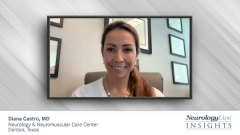
Optimizing Multidisciplinary Care and Emerging Therapies to Support Independence in Advanced DMD
An expert discusses how older Duchenne muscular dystrophy patients in advanced stages face uncertainty regarding newer therapies since most research focuses on younger children, but gene therapy and other treatments remain considerations alongside comprehensive specialty care for managing complex comorbidities.
Episodes in this series

Video content above is prompted by the following:
The case of the 16-year-old patient highlights the need for additional specialists despite already having cardiology, pulmonology, and orthopedic care. Endocrinology consultation addresses bone health concerns, particularly given the unexpected scoliosis development despite steroid therapy, and monitors for spinal compression fractures through lateral spine x-rays. Gastroenterology input becomes important for managing constipation and monitoring for swallowing difficulties that may require nutritional supplementation or gastrostomy tube consideration as bulbar weakness progresses.
Maintaining primary care relationships remains crucial for routine health care needs like vaccinations and acute illness management, preventing unnecessary burden on specialty teams. The complexity of advanced Duchenne muscular dystrophy (DMD) requires coordination between multiple specialists while preserving a medical home concept for comprehensive care management. This approach ensures appropriate resource utilization and maintains family comfort with accessing care for various health concerns.
Treatment options for patients with advanced DMD remain challenging to define in 2025 due to limited data in older patients, as most clinical trials focus on younger boys (ages 4-10). The patient's stop codon mutation excludes exon skipping eligibility, but gene therapy received accelerated approval for older individuals, though long-term efficacy and safety data in nonambulatory patients remains limited. Ofloxacin represents another option but requires careful monitoring for gastrointestinal adverse effects and laboratory abnormalities. The segment emphasizes the importance of comprehensive discussions about current treatment options and clinical trial opportunities, recognizing that therapeutic decisions in advanced disease require careful consideration of potential benefits versus risks in the context of existing comorbidities.
Newsletter
Keep your finger on the pulse of neurology—subscribe to NeurologyLive for expert interviews, new data, and breakthrough treatment updates.













